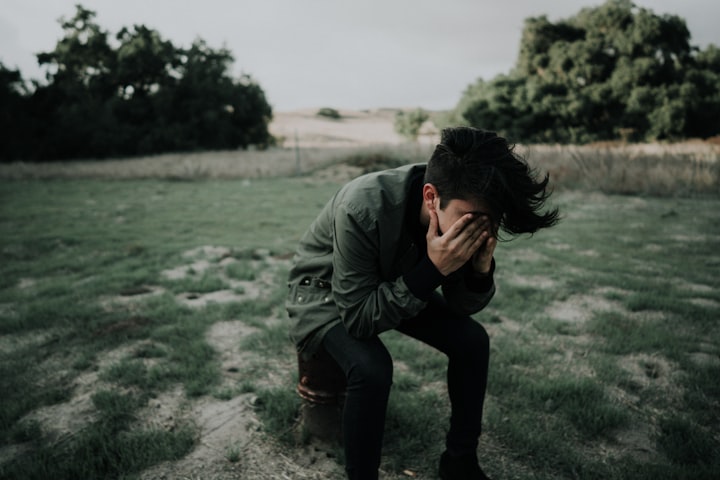I Feel Awful: Ways to Cope if You Feel Depressed
Strategies for surviving depression from someone who has a lifetime pass.

Depression is a crummy thing. It can strike as the result of a breakup, a job loss, a death, or any number of things. For many people, their brain predisposes them to feel depressed for no reason.
Whatever reason it may be, depression sucks. I live it every day, as I am diagnosed with bipolar so depression is a recurring problem for me.
One question I’ve been asked is what to do if you’re feeling depressed. This may be a person with depression who lives it regularly, or it may be someone who is experiencing a temporary depression for any number of reasons. What follows is my survival guide for dealing with depression.
First off, know that you’re not alone. The statistic that’s thrown out a lot is 1 in 5 people, or 20%, deals with mental illness at some point. People try to visualize that in terms of millions of people worldwide. It’s more helpful to visualize it on a small scale.
If you are having a bout of depression, stop and think of the first five people who come to mind. Anyone, family, friends, coworkers, doesn’t matter. Statistically, one of them is dealing with some kind of mental illness or depression too. You probably don’t know who it is because we as a culture don’t talk about our feelings very much.
Second, lean on your network a bit. I spent a lot of the past ten years building a support network of people I can call on in an emergency, with multiple layers of redundancies in case someone is not available. Find someone you can talk to and who will make time for you. Find multiple someones, preferably.
A caveat: always remember that nobody is required to do your emotional labor, and if they say that they can’t help you, please respect that. But more often than not, they’ll be happy to help the person that they care about.
Third, be honest. You get nowhere by beating around the bush. Tell them: “I’m depressed.” Tell them why. Be honest with them and yourself. They very well may know what you’re going through and just never talked about it. If you don’t know why you feel depressed or anxious, tell them.
Don’t be afraid if you aren’t sure. “I don’t know” is a legitimate reason to be depressed. There are plenty of times that I have gotten anxious or depressed with no obvious trigger or event. It happens to plenty of people.
Keep your options open. Explore therapy. Consider medication if it’s bad enough or if you’re suicidal. I will be taking pills every day for life, but not everyone needs to, so don’t assume you will inherit a new weight in your life.
If you are contemplating hurting yourself or someone else, call a crisis line. People who operate the lines are there for you, and there is no shame in seeking help.
You can talk to friends if you’re having suicidal thoughts, but most of us aren’t equipped to deal with that kind of thing, and many people will react poorly to hearing that their friend is contemplating suicide.
People on crisis lines are trained to deal with suicidal individuals, and you will not be the first suicidal person calling that day. We have a crisis line at my job that receives tens of thousands of calls annually, and about one in three callers to our crisis line are suicidal, so you may not even be the first suicidal person calling that hour.
If you seek help from your friends, be prepared to get bad advice. We all want what’s best for our friends, but humans are really bad at giving advice and comfort. If you are looking for advice, be explicit about it. If you just need to vent, tell the person that. It doesn’t help if you just need to blow off some steam and your friend keeps trying to give you unwanted advice.
Sometimes the best thing a person needs is someone to just smile and say “uh-huh” and “yeah” at the appropriate times and say things like “that really sucks, I’m sorry,” without any advice or suggestions attached.
Remember: the right to self-care should never be denied. Take care of yourself as early and as often as you can. If you take care of your mental health, you will be better equipped to face the day even on hard days.
Know when to say “no” to a request to go out with friends. Know when you’re able to listen to other people’s problems and when you just can’t anymore. Learn to recognize when you’re getting to a breaking point — it’s harder than it seems for many people, and very often you only discover that you were close to your breaking point after you’ve already broken.
People are often afraid that their friends won’t understand or will be upset if you don’t want to go out, but generally, people do understand when you need time to yourself. You often don’t see it when you’re depressed, but your friends are friends for a reason.
It can be especially hard to stay above water when you have other people to take care of. If you’ve got kids, or if you work in a caregiving field like nursing or teaching, or if you have an elderly parent in your charge, much of your life is focused on taking care of others.
For those people, I refer you to the point above: take care of yourself too. If you take time to care for yourself, you will be better equipped to care for others. It’s hard, and you can’t just abandon your kids or the people in your care, but everyone needs time to themselves, especially caregivers. Burnout is a thing, and it is especially hard on people who are already suffering from depression or stress or anxiety.
Finally, YOU ARE NOT ALONE. I know I said that above, but you’re not. Remember those four people I asked you to visualize? They’re important because you can never really know unless you talk about it.
When I tell people about my mental health issues, none of them would have ever guessed. I’ve had a few say that they thought there might be something, but they never guess how severe it actually is.
People think of mental illness as the crazy homeless guy, or the serial killer, or the school shooter, or the people who jump off the Golden Gate Bridge every year. But there are plenty of people with mental illness who deliver packages, or sell electronics, or own businesses, or give sermons every Sunday.
We go through life with our friends and family and coworkers, and sometimes we never really learn much about them. I’ve talked about how I don’t really relate to the men in my social circle and likely never will. They don’t talk about their feelings, and I just have to accept that.
We, as humans, tend to bottle our emotions, especially the dark and embarrassing ones, and keep them to ourselves, never telling a soul. We do this for different reasons, depending on the person, and sometimes we internalize them so seriously that we don’t even admit that we have them to ourselves.
That’s not good. We need to be honest about our feelings, especially to ourselves. If you can’t be honest with yourself, how can you be honest with anyone else about how you feel?
If you don’t believe me, start Googling mental health support groups in your area. The National Alliance on Mental Illness is a great place to start. Hang around message boards where people talk about their mental health. Post to them, even anonymously. You will probably be surprised by how many people feel the way you do.
I received a call from someone close to me who reads my articles, and they were on the verge of tears because the things I described sounded like things they felt when they were young, but for decades they thought they were the only person in the world to feel that way. It was cathartic to know that not only were they not alone, but one of the people who could relate was right there the whole time.
When you feel depressed, you feel like you’re the only person in the world who knows what it’s like. Everyone seems so happy all the time, and you don’t want to drag everyone down with your shitty problems.
The reality is that many of the people close to you have been through the same thing at one point or another and know exactly what you’re going through. They’re probably happy to empathize with you and listen to you gripe and let you cry on their shoulder and tell you it’s going to be okay because it is. It is going to be okay. You are strong, and you can get through this.
I’m sitting at my dining room table writing this and trying not to cry as I remember all the times I felt like this. It’s hard to be depressed. You feel like garbage and you may not know why, and nothing feels good no matter what you do.
It’s like all your favorite foods now taste like over-whipped, unseasoned mashed potatoes, and no matter what spices you add or things you do, it’s just bland potatoes. Eventually, you stop adding spices, then you stop cooking other things at all and just resign yourself to a life of bland, tasteless potatoes. Why bother with anything else?
(Not trying to bash on mashed potatoes, it’s just a metaphor.)
But again, no matter how you feel right now, it’s going to be okay. The caveat is that you have to find a day where you have a little extra energy and put a bit of effort into it. Talk to a friend who might be able to help. See if you can get in to see a therapist.
A lot of workplaces have Employee Assistance Plans (EAPs). They can connect you with a therapist for a limited number of sessions, usually for no or low cost. Talk to your HR person about it. It’s usually confidential and handled by an outside agency so your company doesn’t know about what you use it for. Get connected to someone who can help, then go to the appointment.
If you have made it so low that you are contemplating suicide, call a crisis line. They are there to help, and they won’t judge you. If you’re not sure, try to find some encouragement to call or someone to call on your behalf. Having someone to support you while you talk to them can help a lot.
If you would rather die than call a crisis line, find someone or something to live for and use that as a motivator. It doesn’t have to be big. You could want to live so your spouse and kids don’t have to live without you, you could want to live because if you die, nobody will feed your cat, you could want to live because you haven’t seen the latest Marvel movie and you really wanted to — anything to keep you going for a few hours until you can call the line.
You can do it. I believe in you.
I will say it again, louder for everyone in the back: YOU ARE NOT ALONE. Don’t let anyone or anything, even your own crummy brain, tell you otherwise.
There are people who care about you, and they want you to get through it. There are people who know what it’s like, and they want you to get through it too. Even when the world seems bleak and dark, and nobody is there for you, you are not alone. You are never alone.
You can do it. I believe in you.
This article was previously published by me on Medium. You can find it here.
About the Creator
Matthew Maniaci
Living with and talking about mental illness in an open, honest way to help break down stigma. I was one of those suicidal kids you read about. He/him/his.






Comments
There are no comments for this story
Be the first to respond and start the conversation.